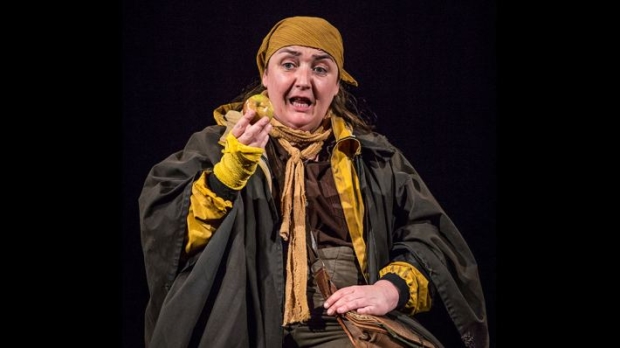Light Shining in Buckinghamshire (NT Lyttelton)
Lyndsey Turner’s production of Caryl Churchill’s play kicks off Rufus Norris’ leadership

© Marc Brenner
Here’s a clarion call for the radical left. Caryl Churchill‘s Light Shining in Buckinghamshire is a potted history of the English civil war, but instead of the Roundheads and Cavaliers of school textbooks, it shows us left-wing revolutionaries and conservative pragmatists. The battle is between egalitarianism and economic success. With clever use of costume, Lyndsey Turner stretches that history to look like the last 400 years, arguing that we have been moving towards equality and that it’s time, now, to take the next step.
She builds a case out of the play’s patterns. Churchill’s central scene is an edited, verbatim account of the Putney debates of 1647, at which England’s parliamentary system was formed. Where the radical Levellers push for universal suffrage and maximum democracy, the military, led by General Ireton (Leo Bill) and stressing the need for stability, put the case for a system based on elected representatives. Oliver Cromwell (Daniel Flynn) sides with the parliamentarians.
It proves another elitist hierarchy, less so than the aristocracy that preceded it, but still prone to exploitation by the rich and powerful. When the poor turn the commons into allotments, it is Parliament that reclaims the land for a large-scale harvest. The argument for doing so is essentially "the national interest." (Copyright: Cameron and Clegg, 2010.)
Here, we get a second debate to match it: a group of destitute drunks, sat on crates, sharing their bread and their beer, blaspheming and arguing for the abolition of property. It is by far the more human meeting. The rigid, regimented equality of Putney has become more free-form. There’s colour, warmth and feeling instead of dry legalese. Gone are the seventies-style leather-jacketed militants, who had looked so modern next to their cavalier predecessors in collars and cuffs. In their place are men and women in raincoats – laughing, listening and lending one another support. They look – and dream – like Occupiers, and, stood in the downpour that symbolizes the return of the king, they seem readier to resist than ever.
Around these, Light Shining… is a play of moments – some of which sing out, some of which get bogged down. A pinched Amanda Lawrence implores a young woman to abandon the child she can’t afford on a doorstep. Trystan Gravelle‘s Briggs, with a Brandian backcomb, stands up to his superior officers. Ashley McGuire stands in for the voiceless poor as a mumbling Margaret Brotherton and Steffan Rhodri, as a butcher selling meat to the rich, turns his ire on us with a stinging speech insisting that we’ve had our fill. In fact, Turner’s judicious in her use of direct address, allowing us to feel part of the Putney debates and almost even daring us to speak up.
However, it is also a flinty play with little humour and scant theatricality; a case of ‘Give me metaphor or give me death.’ Es Devlin‘s design does what it can: as an enormous table turns into the land, there is a delicate shift of perspective, turning the poor from Lilliputians dwarfed by sea-flood platters and chest-high pies to life-size humans working the soil together. She uses bodies to brilliant effect and a 50-plus cast, standing shoulder to shoulder, is a powerful thing, especially when singing Helen Chadwick’s choral arrangements in heartfelt harmony.
Light Shining in Buckinghamshire runs at the National Theatre until 22 June












